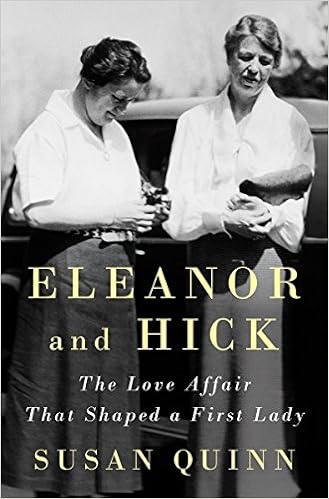
I've always enjoyed presidential history, both men and the women who were behind the president. If you have read FDR or FDR and Eleanor, the Roosevelt years, you may already know a lot of the material covered in this book. However, this time the emphasis is on the incredible women, Eleanor and Hick, who as First Lady and a news journalist, really shaped a lot of policy changes and made women see different choices were possible.
It is well researched, but does not verify the extent of their relationship. It made no difference to me, I didn't need to know any extent of any physical intimacy for the period of time they were in each other's lives before events separated them. The bond of intimacy was very much one of supportive women, social causes, probably more intellectual than deeply physical. People used to be journal and letter writers. Eleanor needed people; Hicks seemed to need Eleanor more than anything besides her career.
They were both misfits in their world with a great deal of emotional baggage from childhood of being unloved and not the social debutante. Eleanor came from a wealthy class; Hicks did not. Eleanor had difficulty feeling worthy and giving love (not that she didn't love) but FDR's polio and the strong influence of her mother-in-law, his need for the spotlight and mistress, often pushed Eleanor aside, except for being a worthy political helpmate. There is no doubt that polio and a political career deeply affected their marriage
A warm, intimate account of the love between Eleanor Roosevelt and reporter Lorena Hickok—a relationship that, over more than three decades, transformed both women's lives and empowered them to play significant roles in one of the most tumultuous periods in American history
In 1932, as her husband assumed the presidency, Eleanor Roosevelt entered the claustrophobic, duty-bound existence of the First Lady with dread. By that time, she had put her deep disappointment in her marriage behind her and developed an independent life—now threatened by the public role she would be forced to play. A lifeline came to her in the form of a feisty campaign reporter for the Associated Press: Lorena Hickok. Over the next thirty years, until Eleanor’s death, the two women carried on an extraordinary relationship: They were, at different points, lovers, confidantes, professional advisors, and caring friends.
They couldn't have been more different. Eleanor had been raised in one of the nation’s most powerful political families and was introduced to society as a debutante before marrying her distant cousin, Franklin. Hick, as she was known, had grown up poor in rural South Dakota and worked as a servant girl after she escaped an abusive home, eventually becoming one of the most respected reporters at the AP. Her admiration drew the buttoned-up Eleanor out of her shell, and the two quickly fell in love. For the next thirteen years, Hick had her own room at the White House, next door to the First Lady.
These fiercely compassionate women inspired each other to right the wrongs of the turbulent era in which they lived. During the Depression, Hick reported from the nation’s poorest areas for the WPA, and Eleanor used these reports to lobby her husband for New Deal programs. Hick encouraged Eleanor to turn their frequent letters into her popular and long-lasting syndicated column "My Day," and to befriend the female journalists who became her champions. When Eleanor’s tenure as First Lady ended with FDR's death, Hick pushed her to continue to use her popularity for good—advice Eleanor took by leading the UN’s postwar Human Rights Commission. At every turn, the bond these women shared was grounded in their determination to better their troubled world.
Deeply researched and told with great warmth, Eleanor and Hick is a vivid portrait of love and a revealing look at how an unlikely romance influenced some of the most consequential years in American history.
No comments:
Post a Comment